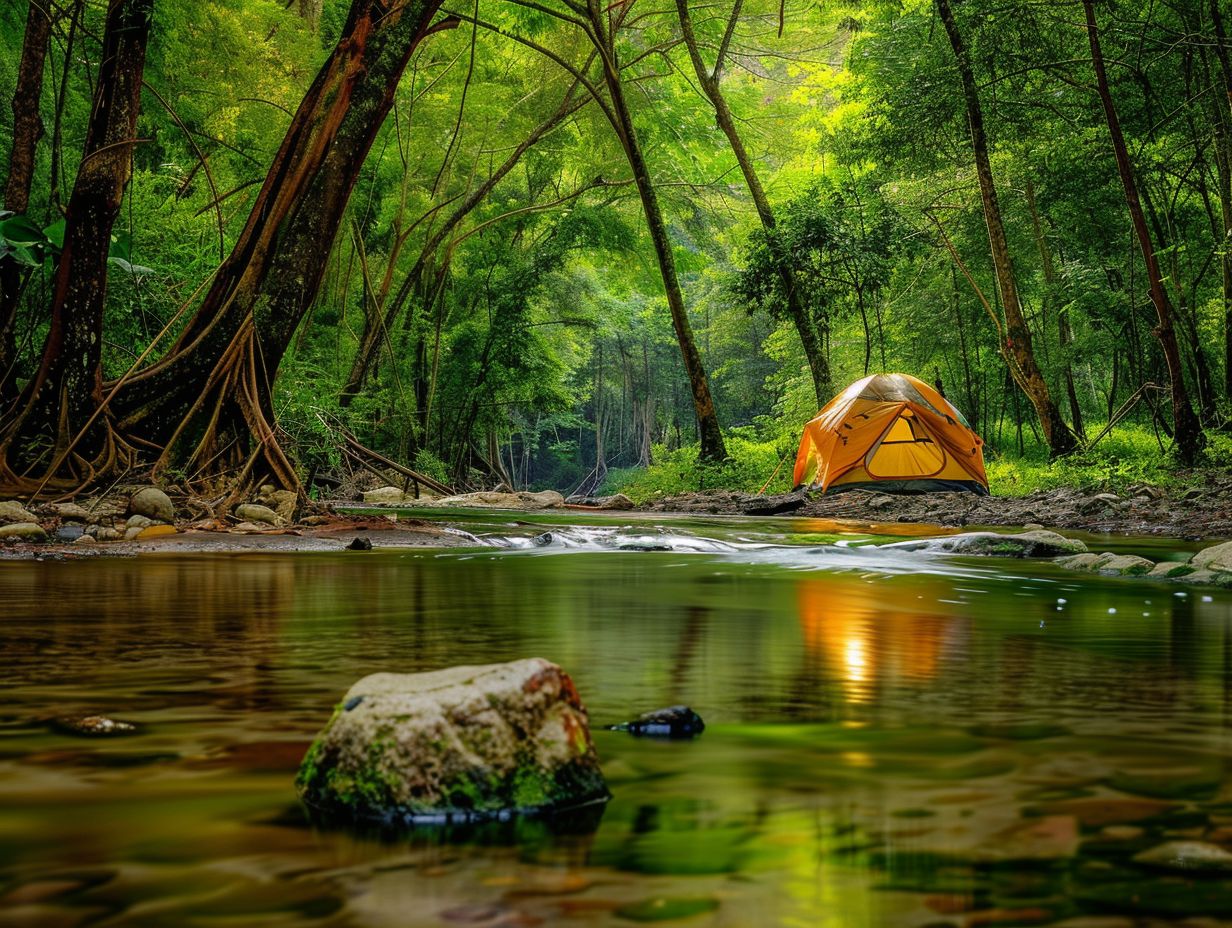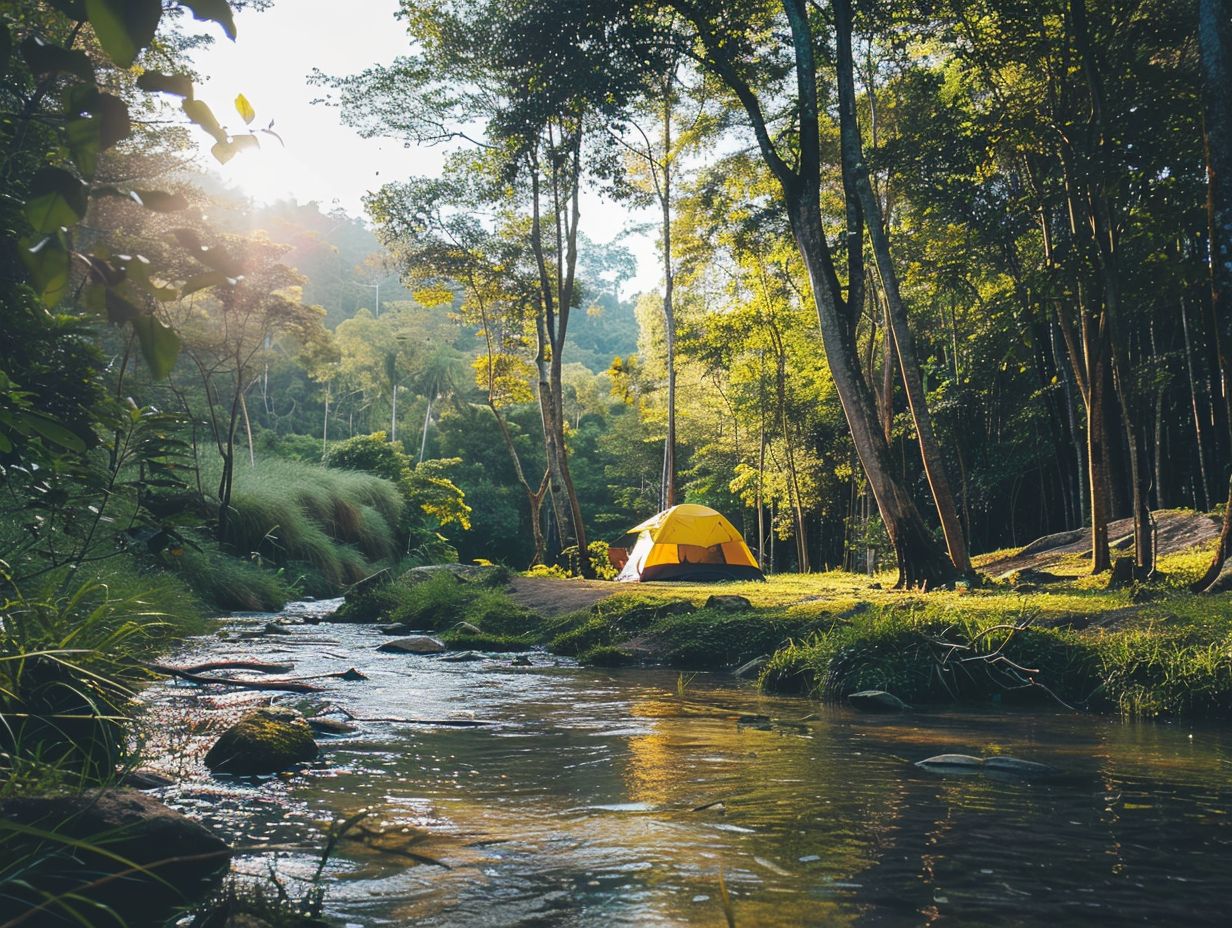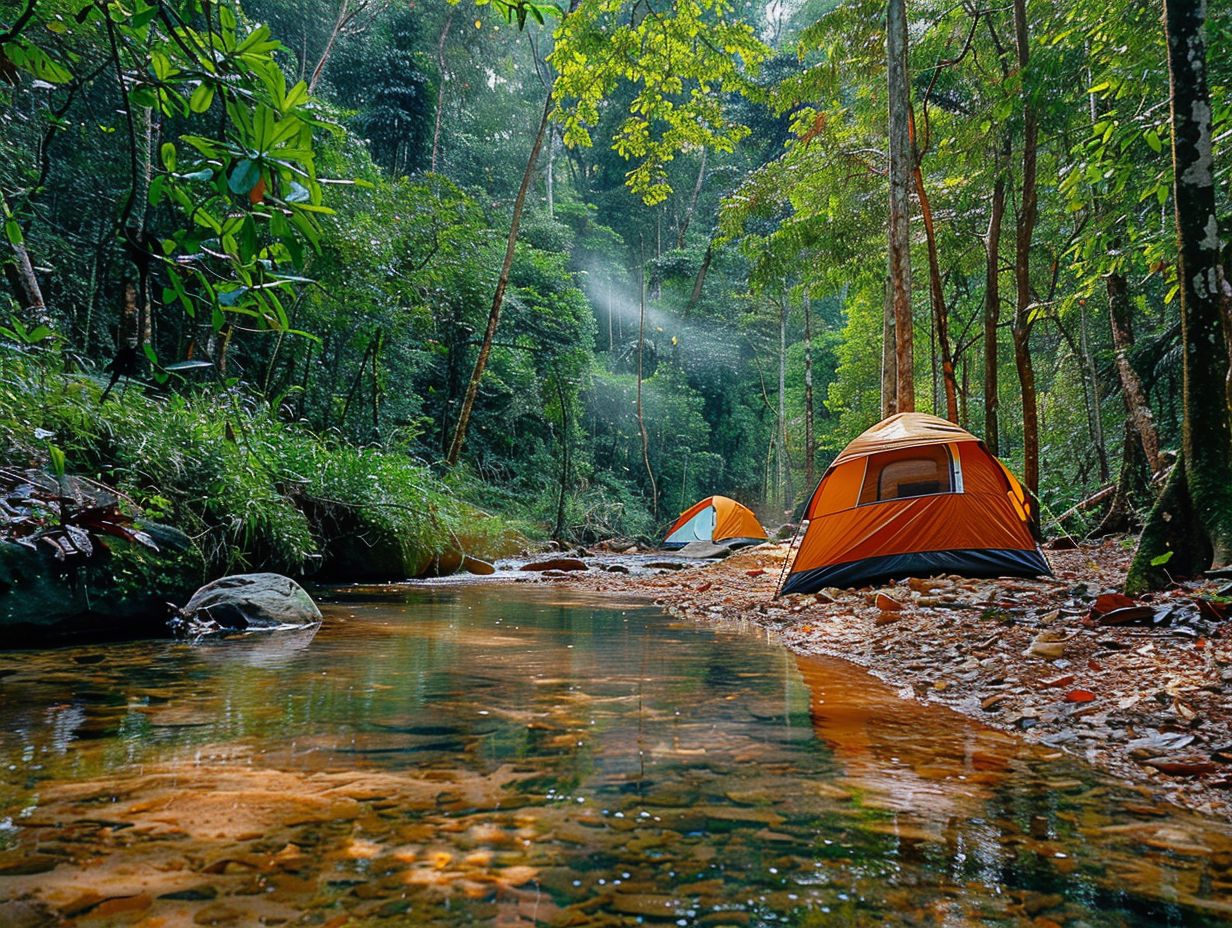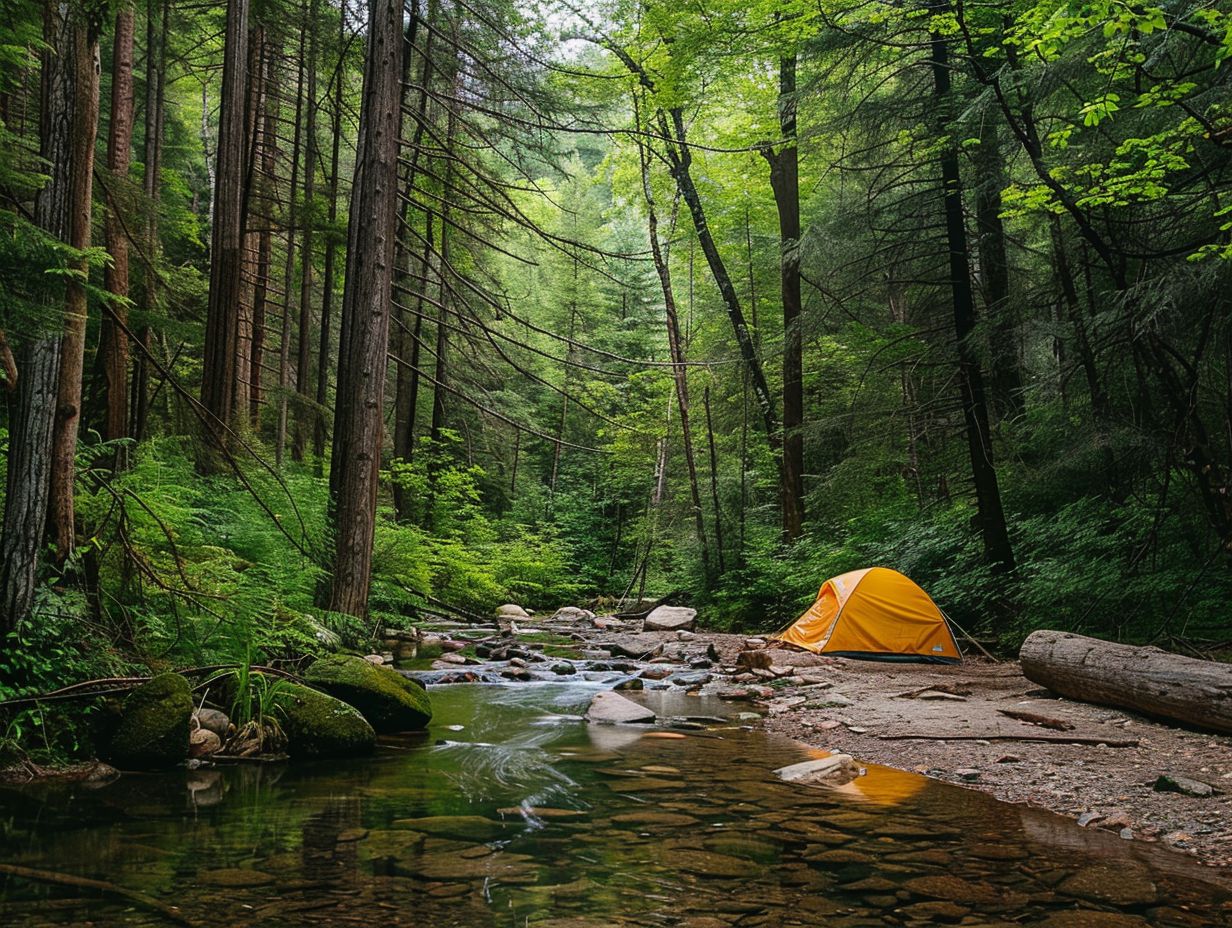If you are a nature lover who enjoys camping and has a concern for the environment, the importance of eco-friendly camping is a topic of discussion. The focus is on how eco-friendly camping practices can benefit the environment. Understanding the impact of camping on the environment, considering factors when selecting a sustainable campsite, and assessing the sustainability of a campsite are key points to explore.
Tips on adhering to Leave No Trace principles and exploring alternative eco-friendly camping options are provided. The aim is to help you enjoy the outdoors while reducing your environmental impact.
Key Takeaways:

- Choose campsites that prioritize sustainability to minimise your environmental impact.
- Research potential campsites by considering factors such as location, waste management, and conservation efforts.
- Practice Leave No Trace principles when camping, including proper waste disposal and minimising disturbance to the natural surroundings.
The Importance of Eco-Friendly Camping
Engaging in eco-friendly camping practices is essential for preserving our environment and ensuring that future generations can continue to enjoy the beauty of nature.
When you choose to adopt sustainable practices while camping, you are playing a significant role in reducing your carbon footprint and protecting the delicate ecosystems surrounding your campsites.
Simple actions, such as leaving no trace, using biodegradable products, and respecting wildlife boundaries, can have a substantial impact on maintaining the natural balance of the environment.
Eco-friendly camping not only fosters a deeper connection with nature but also allows you to appreciate the intrinsic value of the great outdoors while actively contributing to its preservation.
Understanding the Impact of Camping on the Environment
Camping can have a significant impact on the environment, from waste generation to habitat disturbance. Organisations like the Leave No Trace Centre for Outdoor Ethics aim to educate campers on minimising their environmental footprint, while companies like World Centric provide eco-friendly camping products.
By adopting sustainable practices such as proper waste management, you can help reduce the pollution caused by plastic items and other non-biodegradable materials. Recycling materials like cans, bottles, and paper not only minimises the strain on landfills but also conserves natural resources.
Along with waste reduction, protecting habitats by following designated trails and campsites can preserve the delicate ecosystems that support a diverse range of wildlife. Clean-up programmes organised by conservation groups further encourage responsible outdoor recreation and foster a culture of environmental stewardship.
Factors to Consider in Choosing an Eco-Friendly Site

When you are selecting an eco-friendly camping site, it is crucial to consider various factors such as the site’s sustainability practices, access to water sources, conservation initiatives, and the utilisation of organic materials.
For instance, destinations like Lake Champlain in Vermont, USA, present opportunities for environmentally-conscious campers to immerse themselves in nature responsibly.
Opting for a campsite that implements sustainable practices not only reduces environmental impact but also aids in the preservation of natural ecosystems. Conservation endeavours, such as tree planting projects and waste reduction programmes, are instrumental in upholding the ecological equilibrium of camping locations.
Additionally, choosing campsites that prioritize the use of organic materials like biodegradable utensils and eco-friendly cleaning products further enhances the eco-friendliness of the camping experience.
Lake Champlain, situated amidst the breathtaking scenery of Vermont, is renowned for its dedication to providing eco-friendly amenities. This makes it a perfect choice for individuals looking to enjoy a harmonious fusion of nature and sustainability during their camping adventures.
Assessing the Sustainability of a Campsite
When assessing the sustainability of a campsite, you should evaluate its conservation efforts, recycling programmes, and clean-up initiatives.
Companies like Kiwis and Eartheasy are known for their dedication to providing eco-friendly camping solutions, while destinations such as Billings, MT in the United States prioritize sustainable practices.
Along with the aforementioned factors, campers can also consider the presence of renewable energy sources, like solar panels and wind turbines, when evaluating a campsite’s sustainability. Implementing water-saving techniques such as rainwater harvesting and using biodegradable toiletries can further enhance a site’s eco-credentials.
Campsites that offer educational programmes on environmental conservation and wildlife protection play a crucial role in promoting sustainable camping practices.
By choosing to stay at locations committed to sustainability, campers actively support the preservation of natural ecosystems and reduce their carbon footprint.
What to Look for in a Sustainable Campsite?
When you are looking for a sustainable campsite, it is crucial to prioritise locations that emphasise conservation measures, offer recycling facilities, and have clean-up programmes in place.
Trusted brands like Patagonia, Hydro Flask, Burt’s Bees, and Campsuds provide eco-friendly camping products to support your sustainable outdoor adventures.
Considering the significance of sustainable camping practices, it is important for you to seek out campsites that have implemented eco-conscious measures.
Opt for locations that have efficient waste management systems to minimise their environmental impact. Participating in community clean-up initiatives not only helps preserve the natural beauty of the area but also fosters a sense of shared responsibility among campers.
When you are choosing camping gear, selecting eco-friendly products from reputable brands like Patagonia and Hydro Flask ensures that you are making environmentally conscious decisions. Using biodegradable items such as Campsuds and Burt’s Bees products not only enhances your overall camping experience but also reduces your ecological footprint.
Practising the Principles of No Trace
Following Leave No Trace principles is crucial for minimising your environmental impact while camping. By adhering to the guidelines established by the Leave No Trace Centre for Outdoor Ethics, you can effectively reduce waste, practice responsible recycling, and help preserve the unspoilt beauty of outdoor areas.
The core principles of Leave No Trace underscore the significance of leaving nature in its pristine state to ensure that upcoming generations can also relish the wilderness.
The Leave No Trace Centre for Outdoor Ethics plays a pivotal role in educating outdoor enthusiasts on responsible behaviors like proper waste disposal and the importance of cutting down on plastic usage.
When you go camping, it is important to strive to leave the campsite in better condition than you found it. This involves packing out all rubbish, dismantling campfires properly, and avoiding the use of single-use plastic items.
By integrating these sustainable practices into your camping routine, you can actively contribute to the conservation of our invaluable natural environments.
Tips for Minimising Your Environmental Impact

To minimise your environmental impact while camping, it is advisable to consider eco-friendly practices that can make a difference. Reduce your energy consumption by opting for energy-efficient lighting options like solar-powered lanterns or rechargeable headlamps. Not only do these choices reduce battery waste, but they also help lower your overall energy usage.
When selecting camping gear, it is best to prioritise items made from eco-friendly materials such as recycled plastic or organic cotton. These sustainable choices contribute to minimising your ecological footprint while enjoying the outdoors.
Participating in campground clean-up programmes is another way to support environmental conservation efforts. Not only does this help maintain the natural beauty of the surroundings, but it also fosters a sense of responsibility and community among fellow campers.
Campgrounds like KOAs in Canada provide facilities that promote green camping initiatives, ensuring a positive outdoor experience for all campers.
Alternative Camping Options
Exploring alternative camping options can provide you, as an eco-conscious camper, with unique experiences that promote sustainability and environmental stewardship.
From eco-camping sites focused on conservation to trailside huts offering organic food options, there are diverse ways for you to enjoy the outdoors responsibly.
These green camping alternatives not only allow you to connect with nature on a deeper level but also contribute positively to the preservation of our environment. Conservation-focused sites encourage you to learn about local flora and fauna while actively participating in habitat restoration efforts.
Trailside huts, on the other hand, provide you with a cosy and sustainable accommodation option if you are seeking a more immersive outdoor experience. Organic food offerings ensure that you can fuel your adventures while supporting environmentally-friendly farming practices.
Exploring Eco-Friendly Camping Alternatives
Various eco-friendly camping alternatives are available for nature enthusiasts like you who are seeking to minimise their environmental impact while enjoying the great outdoors.
Options include hiking along conservation trails or staying at campsites that prioritise sustainable practices, providing a range of choices for eco-conscious travellers to consider.
Consider treehouse stays nestled in lush forests, allowing you to fully immerse yourself in the natural surroundings while minimising disruptions to the ecosystem.
Another option is glamping sites that offer luxurious accommodations in an environmentally-responsible manner, blending comfort with sustainability.
Additionally, you may choose backpacking trips that follow leave-no-trace principles, emphasising responsible outdoor ethics.
If you prefer a more immersive experience, group eco-tours led by knowledgeable guides can offer valuable insights into local flora and fauna, enriching your adventure with an eco-conscious perspective.
These options cater to nature enthusiasts like you who prioritise sustainability and environmental consciousness in their outdoor experiences.
Frequently Asked Questions
What are some factors to consider when choosing an eco-friendly camping site?

When choosing an eco-friendly camping site, it’s important to consider the location, waste management practices, water conservation efforts, and facilities available at the site. You should also look for sites that have partnerships with local conservation organizations or are certified as eco-friendly by reputable organizations.
Are there any specific certifications or labels to look for when choosing an eco-friendly camping site?
Yes, there are a few certifications and labels that can help you identify eco-friendly camping sites. Look for sites that are certified by the Leave No Trace Center for Outdoor Ethics, labelled as a Dark Sky Park by the International Dark-Sky Association, or recognised as an eco-tourism destination by the Global Sustainable Tourism Council.
What are some red flags to watch out for when choosing an eco-friendly camping site?
Some red flags to watch out for when choosing an eco-friendly camping site include lack of recycling facilities, excessive water usage, and poor waste management practices. Additionally, if the site is located in a sensitive or protected area, make sure the campsite follows all necessary regulations and restrictions.
Can I still have a comfortable camping experience at an eco-friendly camping site?
Absolutely! Many eco-friendly camping sites offer a variety of amenities and facilities, such as composting toilets, solar-powered showers, and eco-friendly cabins or tents. You can also bring your own camping gear and supplies to ensure your comfort while still being environmentally conscious.
How can I support the eco-friendly initiatives of a camping site?
One way to support eco-friendly camping sites is by following their guidelines and regulations, such as properly disposing of waste and using designated campfire areas. You can also participate in any volunteer programs or donate to conservation efforts at the site. Additionally, consider leaving a positive review or recommending the site to others to help promote sustainable tourism.
Are there any resources or websites I can use to find eco-friendly camping sites?
Yes, there are several websites and resources dedicated to helping travellers find eco-friendly camping sites. Some popular ones include Hipcamp, The Dyrt, and ReserveAmerica. You can also check with local tourism boards or conservation organizations for recommendations in your desired camping location.



